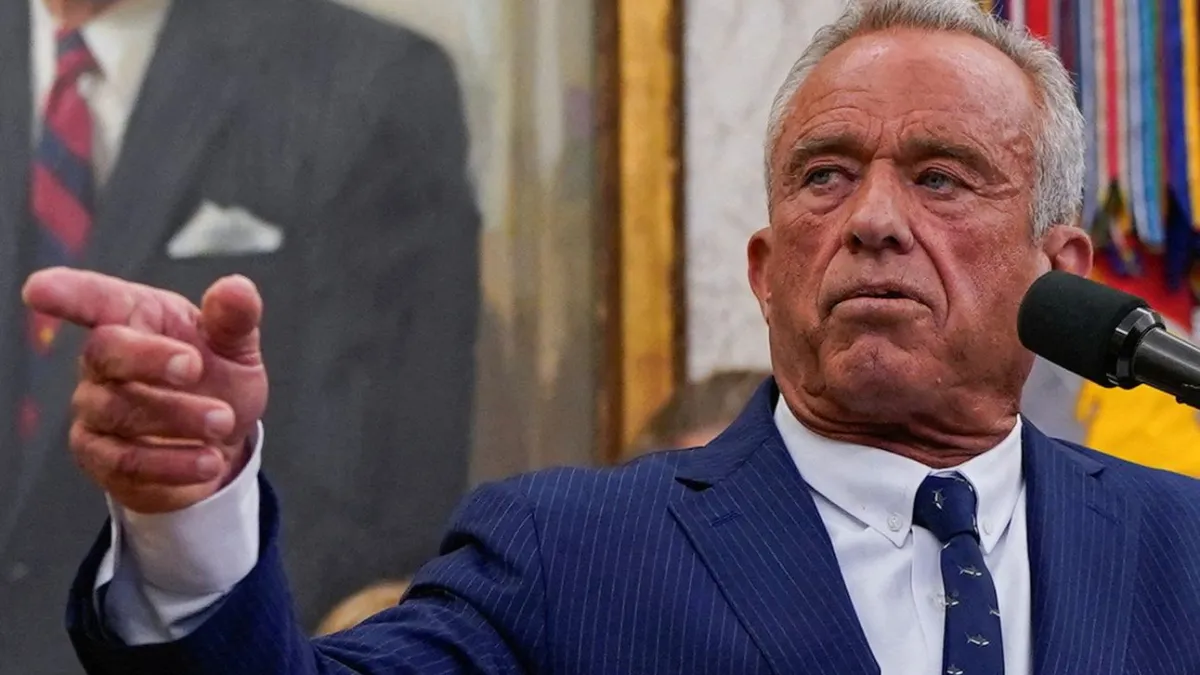
Health and Human Services Secretary Robert F. Kennedy Jr. announced Tuesday that the U.S. government is terminating development of mRNA vaccines and pulling nearly $500 million in funding for such projects. Kennedy, who has a long history of anti-vaccine activism, said the move is meant to refocus efforts on “safer, broader vaccine platforms,” but public health experts greeted the shift with horror, warning that it would leave Americans more vulnerable to the next pandemic.
The Department of Health and Human Services said the decision to wind down mRNA vaccine development activities under the Biomedical Advanced Research and Development Authority (BARDA) followed a comprehensive review of mRNA investments started during the Covid-19 pandemic.
“We reviewed the science, listened to the experts, and acted,” Kennedy said in a statement. “BARDA is terminating 22 mRNA vaccine development investments because the data show these vaccines fail to protect effectively against upper respiratory infections like COVID and flu. We’re shifting that funding toward safer, broader vaccine platforms that remain effective even as viruses mutate.”
HHS said that some existing contracts would be allowed to run their course “to preserve prior taxpayer investment,” but no new mRNA projects would be launched.
Experts disputed Kennedy’s claim about the effectiveness of mRNA vaccines.
“The vaccines were particularly useful during the Covid-19 pandemic because they can be developed and manufactured quickly,” CNN notes. “Multiple peer-reviewed studies have shown that mRNA vaccines developed under Operation Warp Speed during the first Trump administration were highly effective at preventing severe disease and were repeatedly demonstrated to be extremely safe.”
Experts also warned that the move means abandoning the single best technology for rapidly producing vaccines for widespread use and would leave the United States more vulnerable when the next pandemic arrives.
“This decision will have severe consequences, measured in lost lives, when a rapid vaccine response is needed,” Rick Bright, a former director of BARDA who was forced out of the agency during the first Trump administration, told STAT.
Michael Osterholm, director of the University of Minnesota’s Center for Infectious Disease Research and Policy, said this decision stands out as particularly risky. “I don’t think I’ve seen a more dangerous decision in public health in my 50 years in the business,” he told the Associated Press.
Some analysts suggested that the move to eliminate mRNA vaccine research also creates a national security vulnerability. “These tools serve as a deterrent to prevent other nations from using certain biological agents,” Chris Meekins, a Raymond James healthcare policy analyst who previously worked on emergency preparedness at HHS, said in a post on X. “The speed of the technology to create new biodefense capabilities is a national security asset.”
Tuesday’s announcement is the latest in a series of HHS moves in which Kennedy’s vaccine skepticism has affected public health policy, drawing scorn and concern from experts.
* In May, HHS also terminated a nearly $600 million contract signed by the Biden administration with Moderna for the development of vaccines against influenza viruses that could potentially trigger pandemics, including the bird flu. Kennedy also said Covid-19 vaccines were no longer recommended for healthy children and pregnant women.
* In June, Kennedy ousted all 17 members of a Centers for Disease Control and Prevention vaccine advisory committee and replaced them with a new group that included some people with a history of criticizing vaccines.
* Last week, eight leading medical organizations said they had been notified they would no longer be included in the process of establishing new vaccine recommendations. “To remove our deep medical expertise from this vital and once transparent process is irresponsible, dangerous to our nation's health, and will further undermine public and clinician trust in vaccines,” the groups, including the American Medical Association, American College of Physicians and American Academy of Pediatrics, said in a statement.